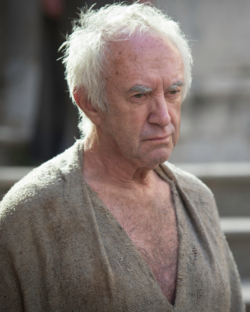In the thread about Sebastian Ronin’s radio podcasts, one of the radio panel members objected what I said about “spirituality.” Since my answer is long for a thread comment, instead of replying there I’ll do it here.
Yes: religion is psychological dissociation according to my book (cf. Day of Wrath). In fact, I dislike the Americans’ use of the term “spirituality” that in my book means dissociation (so much so that there’s a category in this site about “genuine spirituality”). What Manu Rodríguez and I have in mind when we use the word spiritual is something altogether different.
This said, I must confess I feel attracted to religious orders, even after my complete apostasy from Christianity. Yesterday for example I watched several times the scenes of Game of Thrones related to the religious fanatics under the orders of the High Sparrow, the leader of the sect known as the Sparrows whose appearance resemble, in real history, the Franciscans. In Game of Thrones their leader is appointed High Septon, which would be the equivalent in the 14th century to appoint a Fraticelli monk for the papal chair (something that of course never happened).
I like the Sparrows and it makes me think that in the newly-founded ethnostate we will need a sort of Inquisition parallel to this secularized form of teaching the children our Indo-European heritage (again, see Manu’s letter). I liked especially one of the scenes of the High Sparrow with Queen Cersei. He said:
Who carved this altar, do you know? No one does. There’s no name on it, or anywhere else in the chapel. No, the people who built this place didn’t inflict their vanity on those who came after them… Their faith was clean. Strip away the gold and the ornaments, knock down the statues and the pillars, and this is what remains. Something simple. Solid. And true. [YouTube clip linked below, in the words “Cersei treatment”]
Like the High Sparrow, if I were High Septon of the ethnostate I’d certainly ban, with the help of my bloody fanatics—mostly composed of the lowest and humblest of the Holy Faith of National Socialism—, the degeneracy of the old order and even the practices of those white nationalists who basically want to reinstate a sort of Murka II without niggers and Jews, but with drugs, universal suffrage, easy sex, freedom of religion, rock ‘n’ roll and no eugenic program to fix the remnants of mongrelization in mixed whites. I’d ban the sons of Jeremy Bentham and John Stuart Mill that, with their utilitarian goals, in Murka II want to make people, even career women, “happy” and “free” at the expense of anything higher—genuine spirituality. Yes: even white nationalists who use rock in their podcasts would get the Cersei treatment in my envisioned state.
Here I am closer to identitarian William Finck about sexual morality than to those secular white nationalists who believe that they can combine their degeneracy with the revival of the Aryan spirit.
The problem with “spirituality” starts when, in both the real and the fictional worlds (the Fraticelli and the Sparrows were radical egalitarians), their ideology is not based on a strictly racial basis for Aryan preservation.

3 replies on “On genuine spirituality”
Sparrows arrest highborn, out-of-the-closet-homosexual Loras Tyrell here (YouTube clip).
The original meaning of the Latin word religio—from religare, to tie fast—was never used until Constantinian times to describe the ‘superstitio nova ac malefica’ represented by Christianity and has nothing to do with the metaphysical or fideistic concepts introduced by monotheism. It is simply what binds together the members of a political and ethno-cultural community. As such, religion has two aspects: the myth—the representation that we choose to have of our own past, and more generally of the universe, in relation to the future, the destiny that we want to create; and the rite—the evocation and celebration of our being together with the intention of provoking a general mobilisation of spirits, the nationalisation of the masses: a necessary condition for the new European nation to have a destiny worthy of its own past, worthy of what we once were and could be again.
This is the real religious question.
See my postscript to this entry:
https://caesartort.wordpress.com/2016/06/10/game-of-thrones-hillary-clinton/